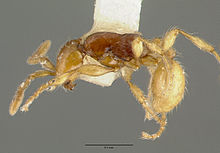Aenictini
| Aenictus | |
|---|---|
 |
|
| A. ceylonicus worker from Indonesia | |
| Scientific classification | |
| Kingdom: | Animalia |
| Phylum: | Arthropoda |
| Class: | Insecta |
| Order: | Hymenoptera |
| Family: | Formicidae |
| Subfamily: | Dorylinae |
| Genus: |
Aenictus Shuckard, 1840 |
| Type species | |
|
Aenictus ambiguus |
|
| Diversity | |
| 181 species | |
| Synonyms | |
Paraenictus Wheeler, 1929
Typhlatta Smith, 1857
Aenictus is a large army ant genus distributed in the Old World tropics and subtropics. It contains about 181 species, making it one of the larger ant genera of the world.
The genus presently has 181 species, distributed through the East Mediterranean, Afrotropical, Oriental, Indo-Australian, and Australian regions. Most of the species are tropical, with terrestrial habitats, foraging in soil, leaf litter, most of the Southeast Asian species forage on the ground, and some on trees and hunting other ant species and termites.
Most species of the genus are specialized predators of other ants, especially of immature stages. Only some Asian species such as Aenictus gracilis, Aenictus laeviceps, Aenictus hodgsoni, and Aenictus paradentatus are known to hunt a variety of invertebrate prey, including ants, using a large number of workers in raids. Foraging raids undertaken by these ants occur both day and night, usually across the ground surface but occasionally also in trees. During raids, numerous workers attack ant nests in a small area, with several workers coordinating their efforts to carry large prey items back to the nest or bivouac. Species of Aenictus are generally small, monomorphic and yellow to dark brown.
...
Wikipedia
